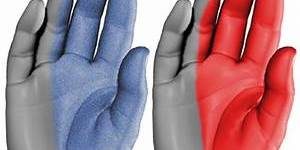“You wake up in the middle of the night with both hands lying across your chest like a couple of plucked bird carcasses, dead of all sensation.” Lynn Coady
Carpal tunnel syndrome. It affects so many women I know. My mother suffered from it years ago, and my cousin was recently diagnosed with it. It’s one of those afflictions that cruelly demands your attention, especially at night.
The carpal tunnel is a narrow space inside the wrist. It is ringed by bone and a band of tough tissue called the transverse carpal ligament. A major nerve called the median nerve runs from the forearm into the hand through the carpal tunnel. Tendons also run through the carpal tunnel.
With carpal tunnel syndrome, the tendons or nearby tissues within the carpal tunnel may swell or thicken. Or the transverse carpal ligament may harden and shorten. This narrows the space in the carpal tunnel and puts pressure on the median nerve. This pressure leads to tingling and numbness of the hand and wrist.
What causes carpal tunnel syndrome?
Doctors aren’t entirely clear on why the condition occurs. Moving your wrist in the same way over and over can cause swelling in the tunnel. This swelling puts pressure on the median nerve and causes carpal tunnel syndrome.
Other things can put people at greater risk for getting carpal tunnel syndrome. These include:
- Being female
- Being pregnant
- Being overweight
- Having diabetes
- Suffering a wrist injury
- Having arthritis
At first, symptoms may occur mainly at night. Later, they may be noticed during the day as well. They may get worse with activities such as driving, reading, typing, or holding a phone.
Symptoms can include:
- Tingling, burning, and/or numbness in the wrist or hand, usually in the thumb, index, and middle fingers
- Sharp pain shooting from the wrist up the arm or down to the fingers, usually at night
- Hand stiffness or cramping, especially in the morning
- Trouble making a fist
- Hand weakness and clumsiness
- Dull aching pain in the hand, forearm, or upper arm
Bio-Touch has been shown to ease the symptoms of carpal tunnel syndrome. While not a substitute for standard medical care, Bio-Touch is an effective complement to mainstream medical protocols. And there are no negative side effects to worry about. Everyone, even children, can learn Bio-Touch!
The Bio-Touch organization is offering a workshop on carpal tunnel syndrome at the Center in Tucson on Thursday October 25th from 6-8PM. Workshop attendees will learn the Bio-Touch points necessary to address the symptoms.
So come and bring your family and friends to the Center at 5634 E. Pima St. in Tucson. It’s so rewarding to share Bio-Touch, and you’ll feel great learning how to help others feel better! For more information or to learn about online classes, go to JustTouch.com

